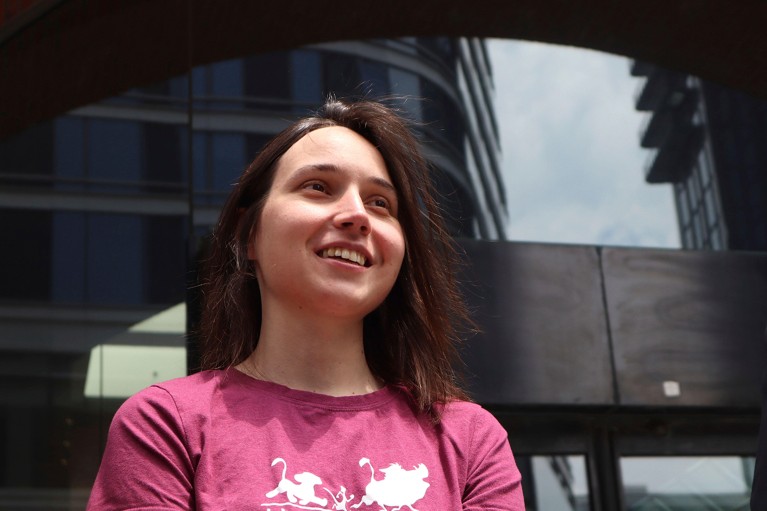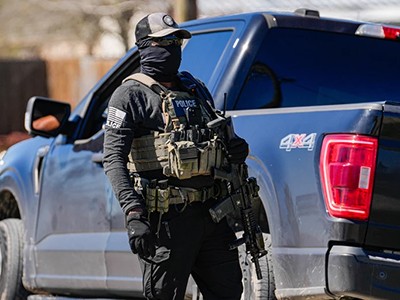After being charged final month with attempting to smuggle frog embryos into the US, Kseniia Petrova, a Russian bioinformatician, was indicted on 25 June on extra prices by a grand jury in Boston, Massachusetts — together with making a false assertion to customs brokers. Petrova is one in all not less than 4 overseas scientists dealing with felony prices for making an attempt to convey organic materials into the nation, including to the anxiousness rippling via the analysis neighborhood because the administration of US President Donald Trump slashes science spending and cracks down on immigration.
Worldwide PhD college students make emergency plans in worry of US immigration raids
Nature talked to analysis and authorized specialists to grasp whether or not these instances cropping up is uncommon and the way lab supplies needs to be transported. Detentions for carrying undocumented organic materials into the US occur yearly, says Jonathan Grode, an lawyer on the immigration legislation agency Inexperienced and Spiegel in Philadelphia, Pennsylvania, who just isn’t concerned in any of the instances.
Sometimes, if an individual enters the nation with a non-hazardous merchandise that’s both prohibited or lacks the right documentation, the authorities confiscate the merchandise, inform the person of the right process to retrieve it and challenge a high-quality for failing to observe protocol, Grode says. If one thing is taken into account hazardous, that modifications the calculus, as does being a repeat offender. In the event you’re each of these issues “you will get arrested, you will be fined and you will be denied entry to the nation”, he provides.
“The principles haven’t modified” underneath the Trump administration, Grode says. What has is the “sensationalism” round any foreigner who has issues on the border, whether or not from the media or from the Trump group highlighting the case in its deportation efforts, he provides.
Customs violations
Petrova, who had been working at Harvard Medical College in Boston, Massachusetts, was arrested in February for allegedly failing to declare the embryos when transporting them to Harvard from France. At a listening to on 18 June, Brian Goldsworthy, an agent for the US Division of Homeland Safety, testified that border brokers at Boston’s Logan Worldwide Airport requested Petrova whether or not she had meals in her bag and he or she stated no — however she was truly carrying a foam field containing the embryos.
Petrova’s immigration lawyer, Gregory Romanowsky, contends that border brokers broke protocol, as a result of the alleged customs violation ought to have triggered a civil course of relatively than a felony one. As an alternative, brokers handled the problem as an immigration violation, revoked Petrova’s visa and began deportation proceedings, he says. She spent 116 days in detention earlier than her launch from federal custody on bail on 12 June.

Kseniia Petrova was launched on bail from federal custody on 12 June.Credit score: Leah Willingham/AP Picture/Alamy
Petrova would possibly have the ability to keep away from among the felony prices, as a result of there are questions on whether or not the embryos have been hazardous, Grode says, however her mistake was to not inform the authorities concerning the embryos within the first place. “That’s the number-one means you’ll find your self in bother,” he says.
In one other case, the US Federal Bureau of Investigation (FBI) arrested Yunqing Jian, a Chinese language postdoctoral fellow on the College of Michigan in Ann Arbor, earlier this month. Based on court docket paperwork, in July final yr, her accomplice, Zunyong Liu, a researcher at Zhejiang College in China, tried to convey samples of a fungus generally known as Fusarium graminearum, which may hurt cereal crops resembling wheat, into the US. He initially denied carrying the fungus in his backpack, the paperwork say, however then admitted he was taking it to Jian’s college, the place he stated he deliberate to check it throughout his go to. Following an investigation by the FBI, each plant pathologists have been charged with conspiracy, smuggling and making false statements, and Liu has additionally been charged with visa fraud. Jian stays in custody in Detroit, Michigan.
Based on a felony grievance filed by FBI agent Edward Nieh on 2 June, cellphone information present that this wasn’t the primary time Jian and Liu had smuggled organic supplies into the US.
‘One other blow’: how Trump’s newest journey ban might hurt analysis
On 8 June, one other Chinese language scientist, Chengxuan Han, was arrested at Detroit Metropolitan Airport. Han, a biologist at Huazhong College of Science and Expertise in Wuhan, was planning to spend a yr conducting analysis on the College of Michigan, in response to a felony grievance filed as a part of the case. The authorities detained her and charged her, alleging that she had, on 4 events, despatched employees members on the College of Michigan “hid organic supplies” that have been “associated to spherical worms”, in response to a press launch issued by the US Legal professional’s Workplace for the Jap District of Michigan.
A Division of Homeland Safety spokesperson instructed Nature that parasitic roundworms could cause vital injury to crops, resulting in financial hardship for farmers. The felony grievance filed with the case doesn’t point out parasitic roundworms — solely Caenorhabditis elegans, a kind of roundworm often used within the laboratory as a mannequin organism.
The hazardousness of the supplies that the scientists despatched will should be assessed in every case, as will the scientists’ intent in utilizing the supplies, however their lack of transparency will make their instances harder, Grode says. “It’s not a lot what was being despatched, however the effort to hide what was being despatched,” he says.



